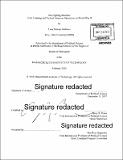One fighting machine : joint learning and tactical airpower operations in World War II
Author(s)
Andrews, Lena Simone
DownloadFull printable version (31.31Mb)
Alternative title
1 fighting machine : joint learning and tactical airpower operations in World War II
Joint learning and tactical airpower operations in World War II
Other Contributors
Massachusetts Institute of Technology. Department of Political Science.
Advisor
Barry R. Posen.
Terms of use
Metadata
Show full item recordAbstract
militaries learn in war by developing and testing a theory of wartime military learning in the joint operational context. In doing so, the dissertation makes three related arguments. First, it examines not just whether militaries learn in war, but how militaries learn in war. Specifically, it defines learning as a process that includes two distinct but related phases: first, identifying a problem and, second, implementing a solution. From this conceptual standpoint, the dissertation then proposes a theory of wartime military learning that can explain and predict both whether and how a military is likely to learn the lessons of war, which I call Military Filtration Theory (MFT). MFT argues that wartime military learning is best explained by examining the interaction of two key variables: first, the state's national military strategy and, second, the military's resource endowments. These two variables act as a filter on the information that is identified and absorbed by military organizations throughout the learning process. Finally, the dissertation tests MFT against several alternative explanations in the novel and challenging empirical setting of joint operations. Specifically, I examine the different experiences of the British, American, and German militaries in successfully learning to execute tactical airpower operations during World War II. In addition to demonstrating variation in the learning process, these three cases allow me to focus on a subset of joint operations that sets a high bar for existing theories of military learning in ways that the extant literature does not. The findings of this study provide new theoretical and empirical insights for students of military learning, as well as several practical lessons for policymakers and warfighters.
Description
Thesis: Ph. D., Massachusetts Institute of Technology, Department of Political Science, 2018. Cataloged from PDF version of thesis. Includes bibliographical references (pages 389-408).
Date issued
2018Department
Massachusetts Institute of Technology. Department of Political SciencePublisher
Massachusetts Institute of Technology
Keywords
Political Science.